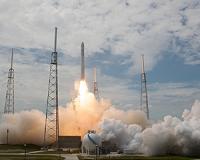 |
Moscow (AFP) Dec 5, 2010 Three Russian navigation satellites crashed into the Pacific off the US state of Hawaii Sunday after the rocket carrying them failed to reach orbit, officials from the Russian space agency said. The capsule carrying the three Glonass satellites plummeted into the sea 1,500 kilometres (900 miles) off Honolulu, one official told Russia's RIA-Novosty news agency, adding that there had been no casualties. The failure is a setback for Russia's attempt to put a satellite navigation system in place to rival the United States's GPS (Global Positioning System) and steal a march on Europe's fledgling Galileo system. Prime Minister Vladimir Putin has underscored the strategic significance of developing the Glonass system to ensure Russia's technological independence. "According to preliminary data, the Proton rocket that took off from Baikonur at 1:25 pm (1025 GMT) took a wrong trajectory," said a Russian space agency source cited by Interfax. "Consequently, the booster rocket could not put the satellites in the intended orbit and it fell back with them into the atmosphere," the source added. Once separated from the Proton rocket, a second-stage booster rocket with the three satellites aboard should have put them in orbit about 20 kilometres (12 miles) above the earth. "The ballistics experts have checked everything: the upper-stage rocket with the satellites is not on the main, intermediate nor emergency orbit," a source told RIA Novosti. The three Glonass-M satellites, weighing 1.4 tonnes, were supposed to complete a constellation of satellites already put in place by Moscow. Putin said in April that Russia planned to equip all new cars sold in Russia in 2012 with the new navigation system, developed by the Russian military in the 1980s. He said Moscow planned to launch a total of seven new Glonass satellites which would ensure coverage of the entire planet, bringing to 27 or 28 the number of operational satellites. Russia would spend 1.7 billion rubles (40 million dollars) in 2011, after two billion rubles spent in 2010, Putin said. Rokosmos, the Russian space agency, said in 2008 that Venezuela and Cuba were interested in adopting the new system. Russia's defence ministry confirmed the loss, but insisted Sunday's accident would not affect the roll-out of the new positioning system. "There are currently 26 satellites in the Glonass constellation, including two emergency satellites. This allows complete coverage of Russian Federation territory," the ministry said in a statement. "The Russian space industry's capacity enables us to react rapidly to what's happened," it said, adding that the system would be fully in place next year in any case.
Share This Article With Planet Earth
Related Links Launch Pad at Space-Travel.com
 NASA Sets Coverage For COTS 1 Launch
NASA Sets Coverage For COTS 1 LaunchCape Canaveral FL (SPX) Dec 01, 2010 The first SpaceX Falcon 9 demonstration launch for NASA's Commercial Orbital Transportation Services program is targeted for liftoff on Tuesday, Dec. 7. Liftoff will occur from Launch Complex 40 at Cape Canaveral Air Force Station in Florida. The launch window extends from 9:03 a.m. to 12:22 p.m. EST. If necessary, launch opportunities also are available on Dec. 8 and Dec. 9 with the same ... read more |
|
| The content herein, unless otherwise known to be public domain, are Copyright 1995-2010 - SpaceDaily. AFP and UPI Wire Stories are copyright Agence France-Presse and United Press International. ESA Portal Reports are copyright European Space Agency. All NASA sourced material is public domain. Additional copyrights may apply in whole or part to other bona fide parties. Advertising does not imply endorsement,agreement or approval of any opinions, statements or information provided by SpaceDaily on any Web page published or hosted by SpaceDaily. Privacy Statement |